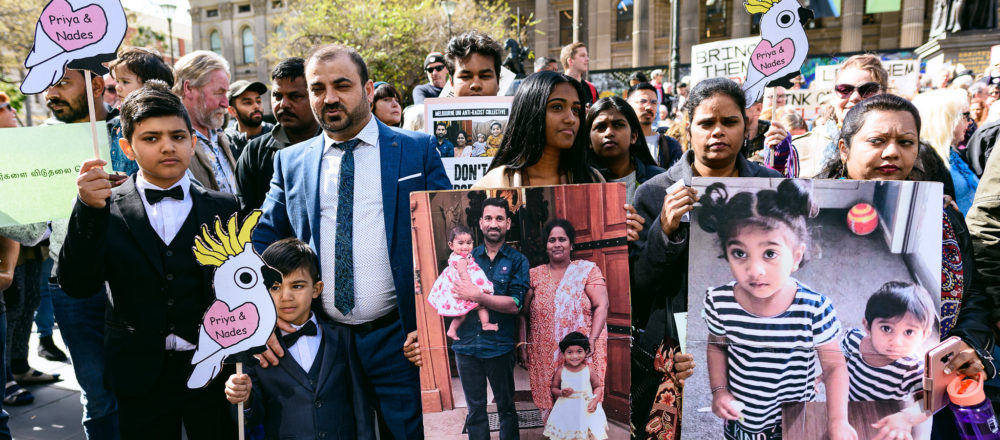In 2019, the government’s decision to detain and attempt to deport the Biloela family sparked a powerful and emotional public outcry in the Australian community, encouraging Prime Minister Scott Morrison to personally intervene to allow them to stay. The family consists of a Tamil couple, Priya and Nades Murugappan who were refused refugee visas, and their two Australian-born children, Kopika and Tharunicaa. Many activists and the local community became sympathetic to the family who were raising their children while living, working and volunteering in the regional Queensland town of Biloela.
Part of the outcry stemmed from the fact that both children were both in Australia and were considered by the public to have a right to remain in the country. However, despite the vocal protests against the deportation of the children, being born in Australia does not automatically guarantee Australian citizenship or protection. Contrary to popular understanding, generally, Australian-born children cannot acquire citizenship unless they are born to Australian citizens or permanent residents, or if they have lived in Australia for over ten years.
For this reason, the Biloela children are in a precarious situation — they were born in Australia and have not known any other country, but our laws do not consider them Australian citizens. The Minister for Home Affairs Peter Dutton referred to both children, Kopika and Tharunicaa, as “anchor babies“ used by their parents to improve their chances of obtaining a refugee visa and remaining in Australia permanently.
***
It is somewhat shocking to think that Australian-born children can be classified as “alien”. Many believe that a person’s place of birth attracts a permanent connection to that land and therefore the right of citizenship, irrespective of the connection of their parents to that land. This principle is known as ‘jus soli’ (‘law by soil’) or termed ‘birthright’ in the US.
Birthright citizenship is rare among common law countries. In the US, birthright citizenship is enshrined in the 14th Amendment of the Constitution and is therefore very difficult to revoke. Some may recall President Trump’s recent threat to abolish jus soli, vowing to end the right of citizenship for children born in the US to non-citizen parents. This proposal has yet to be successful due to the protection of jus soli citizenship under the Constitution.
The history of citizenship in Australia
Unlike the United States, citizenship in Australia is not a constitutional right. Australian citizenship has a long and complex history as a result of British imperial control. As late as 1948, there was no such thing as Australian citizenship. Rather, residents were categorised as British subjects.
Determining who is granted citizenship in Australia is fixed by legislation.
The criteria determining who is granted Australian citizenship can, therefore, be adjusted according to changing community perceptions of who should be entitled to citizenship and, more pertinently, who should be excluded.
Whilst Australian citizenship began as jus soli, granted to all Australian-born children, it did not last long. In 1986, the Australian parliament amended the Australian Citizenship Act to implement citizenship based on ‘jus sanguinis’ (‘law by blood’), under which citizenship is determined by looking to the citizenship of the parents. Jus sanguinis citizenship is common practice across the globe, including the UK, New Zealand and Ireland.
Why was birthright citizenship abolished?
The 1986 Amendment begs the question: what prompted the Australian parliament to abolish pure jus soli citizenship? The amendment was primarily catalysed by the 1985 case of Kioa v West where the government argued that jus soli citizenship was being abused to obtain an immigration advantage.
Kioa was a Tongan citizen who overstayed his student visa and subsequently had a daughter born in Australia. Kioa unsuccessfully argued that as an Australian citizen under the principle of jus soli, his daughter was entitled to a legitimate expectation of continued residence in Australia, despite the deportation order against her parents.
As a result of this high-profile case, the Minister for Immigration and Ethnic Affairs at the time declared that jus soli citizenship was:
“a generosity in our law [that] can be exploited by visitors and illegal immigrants who have children born here in order to seek to achieve residence in Australia”.
The amendment had widespread bipartisan support and appeared to be motivated by xenophobic fear-mongering that the country was overrun by “illegal immigrants”.
The relatively open immigration policy of Australia post-WWII, prompted by a labour shortage and need to increase the population, was beginning to lose its appeal among the Australian community by the 1970s and 1980s. As Asian immigration to Australia rapidly increased and anti-Asian sentiment took hold, the 1986 amendment to citizenship was introduced.
Jus sanguinis citizenship is often highly politicised and can be informed by racialised perceptions of who “deserves” to be a citizen. According to Professor Kim Rubenstein, the term “citizenship” was deliberately left out of our Constitution in 1901 because it was politically fraught with different understandings of the meaning and value of citizenship. For instance, granting citizenship to all British subjects was perceived as problematic because this would open the door for Australian citizenship to people from the British colonies of India and Hong Kong – a highly contentious and political issue in the era of the White Australia Policy.
***
Australian immigration history is littered with various exclusionary laws that limited citizenship to those who fit particular criteria – namely, to exclude non-white immigrants. The White Australia Policy which dominated Australian history since Federation in 1901 was (at least nominally) dismantled in 1966. It may be argued that the implementation of citizenship by descent 20 years later was rooted in a similar desire to exclude non-white immigrants.
The case of the Biloela family is not the first time Australia has grappled with the potential deportation of Australian-born children. Tania Singh was born in Mildura in 1998, but in Singh v Commonwealth the High Court held that she was properly considered an “alien” under Australian law because neither of her parents were Australian citizens or residents at the time of birth. Similar to the Biloela family, Singh’s parents were seeking asylum in Australia but had their refugee protection claims rejected. As a non-citizen alien, Singh could be detained or deported under the Migration Act.
Citizenship as the “right to have rights”
The idea of citizenship is powerful. It represents a gateway to the protection of an individual and access to fundamental rights, and in the case of the Biloela family, citizenship would guard against deportation. The extreme vulnerability of stateless persons brings into sharp focus the critical importance of citizenship.
Hannah Arendt, the renowned Jewish philosopher, stripped of her citizenship during the Holocaust, famously argued that citizenship was “the right to have rights”.
This is because citizenship is the basis of legal recognition and its absence often results in limited access to education, healthcare, employment and a myriad of other basic human rights.
The significance of citizenship has attracted much debate among academics and philosophers over who ‘ought’ to be considered a citizen, with some contemporary scholars calling for definitions based on the principles of jus nexi (‘citizenship by connection or linkage’) and jus domicili (‘citizenship by residence’).
In the debate of who should rightly be granted citizenship, it is also important to remember that the Constitution excluded Indigenous Australians from the census of Australian citizens until the 1967 referendum, despite living on the land for tens of thousands of years prior to British colonisation. Whilst it may be expected that the right of Indigenous Australians to live in Australia is a natural consequence of their heritage, even now Indigenous Australians have an uneasy relationship with Australian citizenship. For instance, in the as yet undecided cases of Love v The Commonwealth and Thoms v The Commonwealth, the High Court will be faced with the question of whether the government can legally deport non-citizen Indigenous Australians.
***
Without birthright citizenship enshrined in the Australian Constitution, Australian citizenship law remains vulnerable to political whims. Given the historically racialised perception of citizenship in Australia, the deportation of children born in Australia to non-Australian parents is not surprising. However, the public outcry prompted by this family suggests that Parliament may need to consider adopting a wider and more inclusive notion of Australian citizenship which reflects modern community expectations.





